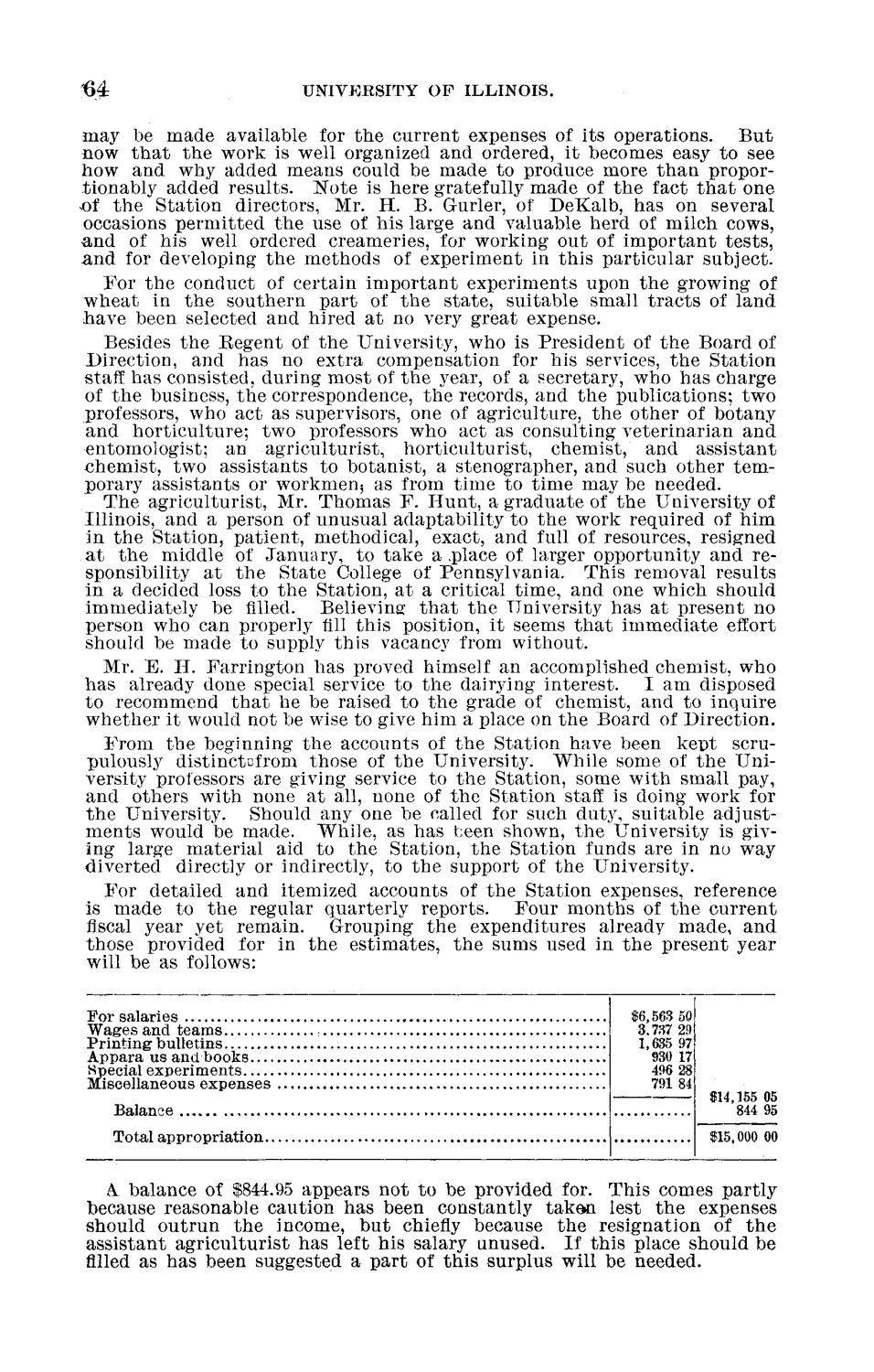| |
| |
Caption: Board of Trustees Minutes - 1892
This is a reduced-resolution page image for fast online browsing.

EXTRACTED TEXT FROM PAGE:
'64 UNIVERSITY OF ILLINOIS. may be made available for the current expenses of its operations. But now t h a t the work is well organized and ordered, it becomes easy to see how and why added means could be made to produce more than proportionably added results. Note is here gratefully made of the fact t h a t one of the Station directors, Mr. H. B. Gurler, of DeKalb, has on several occasions permitted the use of his large and valuable herd of milch cows, and of his well ordered creameries, for working out of important tests, -and for developing the methods of experiment in this particular subject. For the conduct of certain important experiments upon the growing of wheat in the southern part of the state, suitable small tracts of land have been selected and hired at no very great expense. Besides the Regent of the University, who is President of the Board of Direction, and has no extra compensation for his services, the Station staff has consisted, during most of the year, of a secretary, who has charge of the business, the correspondence, the records, and the publications; two professors, who act as supervisors, one of agriculture, the other of botany and horticulture; two professors who act as consulting veterinarian and entomologist; an agriculturist, horticulturist, chemist, and assistant chemist, two assistants to botanist, a stenographer, and such other temporary assistants or workmen 5 as from time to time may be needed. The agriculturist, Mr. Thomas F . Hunt, a graduate of the University of Illinois, and a person of unusual adaptability to the work required of him in the Station, patient, methodical, exact, and full of resources, resigned at the middle of January, to take a .place of larger opportunity and responsibility at the State College of Pennsylvania. This removal results in a decided loss to the Station, at a critical time, and one which should immediately be filled. Believing t h a t the University has at present no person who can properly fill this position, it seems t h a t immediate effort should be made to supply this vacancy from without. Mr. E. H. Farrington has proved himself an accomplished chemist, who has already done special service to the dairying interest. I am disposed to recommend t h a t he be raised to the grade of chemist, and to inquire whether it would not be wise to give him a place on the Board of Direction. From the beginning the accounts of the Station have been kept scrupulously distinctcfrom those of the University. While some of the University professors are giving service to the Station, some with small pay, and others with none at all, none of the Station staff is doing work for the University. Should any one be called for such duty, suitable adjustments would be made. While, as has been shown, the University is giving large material aid to the Station, the Station funds are in no way diverted directly or indirectly, to the support of the University. For detailed and itemized accounts of the Station expenses, reference is made to the regular quarterly reports. Four months of the current fiscal year yet remain. Grouping the expenditures already made, and those provided for in the estimates, the sums used in the present year will be as follows: For salaries Wages and teams Printing bulletins , Appara us and books Special experiments Miscellaneous expenses , Balance Total appropriation. $6,563 50 3,737 29! 1,635 97 930 17 496 28 791 84 $14,155 05 844 95 $15,000 00 A. balance of $844.95 appears not to be provided for. This comes partly because reasonable caution has been constantly takon lest the expenses should outrun the income, but chiefly because the resignation of the assistant agriculturist has left his salary unused. If this place should be filled as has been suggested a part of this surplus will be needed.
| |